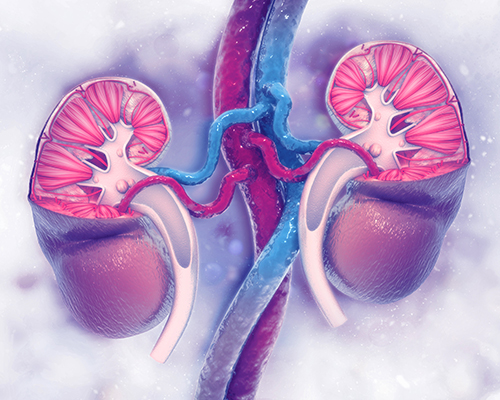
People who suffer with gout are more likely to develop kidney disease.1 Similarly, those with kidney disease are more liable to have elevated uric acid levels and suffer with gout.1 But knowing there could be a connection may not be enough—it is important to know how having gout can affect these important organs. Read on to find out more about gout and kidney disease.
What do the kidneys do?
Your kidneys are small (each one is only about the size of your fist), but they play a big role in your overall health.2 Every 24 hours or so, your kidneys filter about 200 quarts of fluid and return it to the bloodstream (about two quarts of that fluid leaves the body as urine).2 Your kidneys also2:
- Help monitor the production of red blood cells
- Make vitamins that regulate growth
- Help keep the blood pressure steady
- Help regulate the amounts of key nutrients in the body, including calcium and potassium
How does a high uric acid level affect the kidneys?
Uric acid is a waste product your body makes when it breaks down chemicals called purines.3 Purines are found in your body’s own cells and in certain foods and beverages.3 In some people, the kidneys don’t function as well as they should and do not remove uric acid from the bloodstream as quickly as they are supposed to.3 This leads to a buildup of uric acid in the bloodstream and a condition called hyperuricemia.3 In some people with hyperuricemia, crystals can form in the kidneys and cause kidney stones.3
What are kidney stones? And why are they a problem?
Kidney stones are solid, pebble-like bits of material that can form in one or both of your kidneys.4 They can range in size from as small as a grain of sand to as large as a pea.4 Most small kidney stones can pass through your urinary tract without causing any problems.4 Larger kidney stones, however, can get stuck and block the flow of urine, causing intense pain and sometimes bleeding.4 If ignored, they can even cause kidney infection and loss of kidney function.4
How can I manage my gout and protect my kidneys?
If you have gout, there are many things you can do to manage the disease and protect your kidneys. Start with the following5:
- Get Routine Blood Tests—Get checked regularly to see if your uric acid level is normal and measure how well your kidneys are working (also known as your glomerular filtration rate, or GFR).
- Take Your Meds—Are you taking medicine to help manage your uric acid level and prevent gout flares? Even if your uric acid levels improve, do not stop taking your medications without first talking with your doctor.
- Drink Lots of Water—Consuming at least eight cups of water each day can help flush out your kidneys and reduce the amount of uric acid in your bloodstream.
- Eat a Gout-Friendly Diet—Avoid high-purine foods such as red meat, shellfish and alcohol. Skip the processed foods and soft drinks, too.
- Make Healthy Choices—Maintain a healthy weight and exercise regularly. If you smoke, stop.
- See Your Doctor Regularly—He or she can help you manage any other health issues you have, including diabetes, high blood pressure and high cholesterol. And be sure to tell your doctor which medications and supplements you are taking.
NOTE: This article was not written by a medical professional and is not intended to substitute for the guidance of a physician. These are not Hikma’s recommendations for gout flare prevention, but rather facts and data collected from various reliable medical sources. For a full list of resources and their attributing links, see below.
